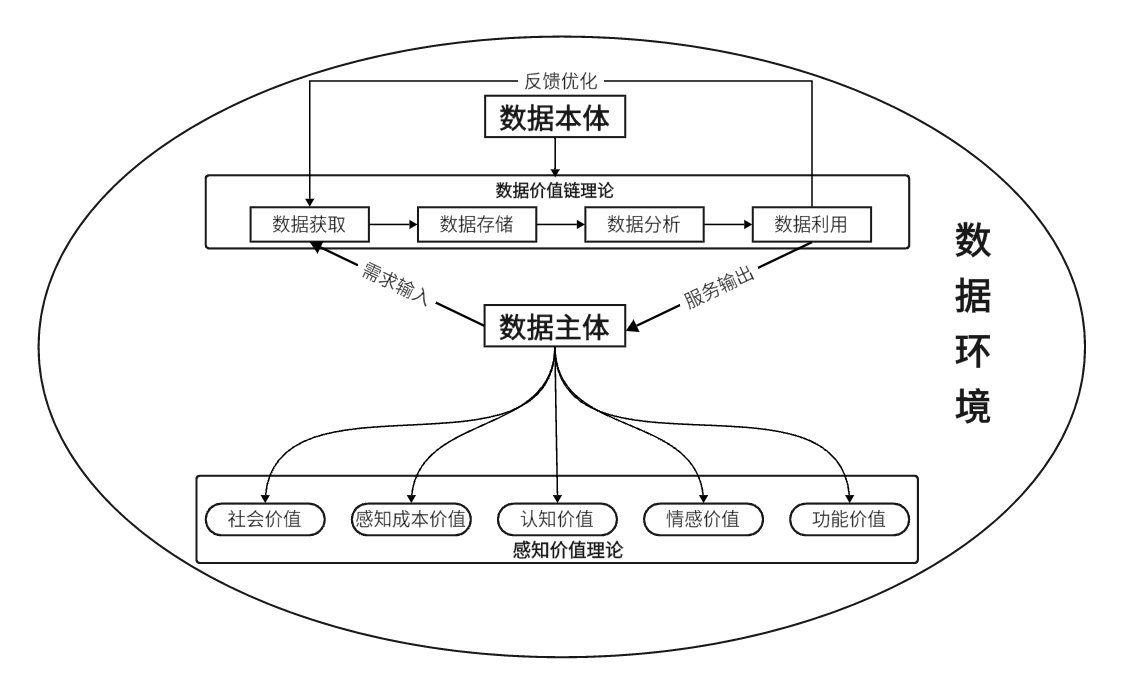Research on the Optimization Path of AI Empowering Library Reader Service from the Perspective of Data Elements
- Zou Kai 1 ,
- Tan Xinyu 1 ,
- Fu Liyun 2 ,
- Jiang Zhiyi 3
Abstract
[Purpose/Significance] This study aims to clarify the optimization path of library reader service empowered by AI from the perspective of data elements, and to provide suggestions for libraries to make more effective use of AI for digital intelligent transformation and promote the release of library value. [Method/Process] Guided by the data value chain theory, information ecology theory and perceived value theory, relevant influencing factors were extracted through grounded interviews from the perspective of data elements, and Fuzzy-ISM was used to divide the three-level influencing paths according to the extracted 15 categories. The characteristics of independent group and dependent group were identified by MICMAC analysis. [Result/Conclusion] The influence path of 15 factors in three dimensions of data subject, data environment and data ontology was determined, and the underlying independent group composed of data storage and technical facilities was established, which was the root driving force of service optimization. By influencing other factors, users' perceived value was affected, so as to achieve a closed loop of value. It provides ideas for the transformation of "data-value" in library.

Key words
data ecology / artificial intelligence / fuzzy interpretative structure model / digital intelligence library
{{custom_sec.title}}
{{custom_sec.title}}
References
| [1] |
中国政府网. “数据二十条”对外发布,构建数据基础制度体系——做强做优做大数字经济[EB/OL]. [2025-09-04].
Chinese Government Website. "Data 20" released to the public, build a data base system, and stronger optimal do big digital economy[EB/OL]. [2025-09-04].
|
| [2] |
中国政府网. 《“数据要素×”三年行动计划(2024—2026年)》发布[EB/OL]. [2025-09-04].
Chinese Government Net. "Action plan for "data elements ×" for three years (2024-2026) "released[EB/OL]. [2025-09-04].
|
| [3] |
中国政府网. 中共中央关于进一步全面深化改革推进中国式现代化的决定[EB/OL]. [2025-09-04].
The Chinese Government Net. The central committee of the communist party of China on further comprehensively deepen reform of Chinese modernization decided[EB/OL]. [2025-09-04].
|
| [4] |
韩茹雪, 饶梓欣, 许鑫. AIGC赋能的GLAM机构内容生产研究[J]. 图书情报工作, 2024, 68(22): 4-15.
|
| [5] |
国家新闻出版署. 第二十一次全国国民阅读调查成果发布[EB/OL]. [2025-09-04].
National Press and Publication Administration.21 times national national reading survey results published[EB/OL]. [2025-09-04].
|
| [6] |
汪聪, 张春红, 高楠, 等. 面向人工智能生成内容时代的图书馆服务适应与创新[J]. 情报理论与实践, 2024, 47(7): 17-24.
|
| [7] |
初景利, 段美珍. 智慧图书馆与智慧服务[J]. 图书馆建设, 2018(4): 85-90, 95.
|
| [8] |
American Library Association. Libraries and adult education: a study made by the American Library Association[M]. New York: Macmillan company, 1926: 27-28.
|
| [9] |
苑艺. 20世纪20至40年代美国公共图书馆阅读指导服务研究[D]. 保定: 河北大学, 2020.
|
| [10] |
|
| [11] |
陈臣. 基于小数据决策支持的图书馆读者个性化服务定制与动态推送系统研究[J]. 图书馆理论与实践, 2022(2): 79-84.
|
| [12] |
郭亚军, 寇旭颍, 冯思倩, 等. 大语言模型赋能图书馆参考咨询服务:逻辑、场景与体系[J]. 图书馆论坛, 2025, 45(1): 118-127.
|
| [13] |
陈丽冰. 智慧图书馆: 价值内涵、主要困境与优化路径[J]. 图书馆, 2023(2): 19-25.
|
| [14] |
|
| [15] |
张磊. ChatGPT应用视角下的公共图书馆智慧服务:机遇、挑战与对策[J]. 图书馆工作与研究, 2024(S1): 30-35.
|
| [16] |
郎书林, 李仪, 叶韵怡. 智慧服务背景下高校图书馆读者数据的安全风险及协同治理对策研究[J]. 图书馆, 2024(11): 44-52.
|
| [17] |
COX C,
|
| [18] |
余望枝, 刘芳.基于智能问答的图书馆参考咨询服务设计及优化[J]. 图书馆理论与实践, 2024(1): 128-136.
|
| [19] |
罗雪英. 高校图书馆阅读推广人素养调查与培育策略——基于对湖南省15家高校图书馆的调研[J]. 图书馆工作与研究, 2024, (10): 75-84.
|
| [20] |
王学琴, 李爱国.加强用户关系管理,提升图书馆服务质量——以东南大学图书馆为例[J]. 大学图书馆学报, 2024, 42(1): 17-22, 39.
|
| [21] |
祁宁, 刘笑含.我国公共图书馆适老化服务体系:演进历程、实践现状与发展路径[J]. 图书馆, 2024(10): 17-15, 109.
|
| [22] |
盛瑞蓬.全民阅读背景下公共图书馆弱势群体阅读服务策略——以天津图书馆视障读者阅读服务为例[J]. 图书馆工作与研究, 2024(S1): 83-87.
|
| [23] |
孔令芳, 张雅彬, 林如诗, 等.数智时代高校图书馆全链路、一站式图书荐购服务平台的设计与应用研究[J]. 大学图书馆学报, 2024, 42(1): 65-71.
|
| [24] |
|
| [25] |
马费成, 吴逸姝, 卢慧质.数据要素价值实现路径研究[J]. 信息资源管理学报, 2023, 13(2): 4-11.
|
| [26] |
孙倬, 李嘉欣, 曹玲静, 等.政策信息学视角下数据要素政策演变逻辑及发展趋向研究[J/OL]. 情报理论与实践, 1-14[2025-06-07].
|
| [27] |
周明生, 周珺.我国数据要素研究的热点与演进趋势[J]. 河南大学学报(社会科学版), 2023, 63(4): 13-19, 152.
|
| [28] |
吕梦, 赵丽芳, 钟英才.数据资产入表的价值效应与经济后果初探[J]. 管理评论, 2024, 36(12): 47-59.
LYU M,
|
| [29] |
王雪, 夏义堃, 裴雷.国内外数据要素市场研究进展: 系统性文献综述[J]. 图书情报知识, 2023, 40(6): 117-128.
|
| [30] |
奉国和, 肖雅婧.数据要素价值释放研究进展[J]. 图书馆论坛, 2024, 44(8): 123-132.
|
| [31] |
|
| [32] |
|
| [33] |
黄益平, 沈艳.数据要素市场化配置多点发力[J]. 经济, 2022(2): 74-77.
|
| [34] |
代佳欣.基于过程的政府数据开放风险识别与防控策略研究[J]. 情报杂志, 2019, 38(6): 145-151.
|
| [35] |
|
| [36] |
夏义堃, 程铄, 王雪, 等.数据空间建设的实践进展与运营模式分析——基于Data Spaces Radar的案例[J]. 图书与情报, 2024(2): 18-32.
|
| [37] |
|
| [38] |
梁泳梅.人工智能发展前沿与就业[J]. 北京工业大学学报(社会科学版), 2025, 25(3): 7-12.
|
| [39] |
张洋, 黄楠, 余厚强.AIGC时代信息资源管理领域发展趋势[J]. 图书馆论坛, 2024, 44(7): 1-8.
|
| [40] |
徐伟, 韦红梅.生成式人工智能训练数据风险治理:欧盟经验及其启示[J]. 现代情报, 2025, 45(5): 89-98.
|
| [41] |
前瞻产业研究院.2024年中国人工智能行业全景图谱[EB/OL]. [2025-07-08].
Forward looking Industry Research Institute. Panorama of China's AI industry in 2024[EB/OL]. [2025-07-08].
|
| [42] |
胡裕岭, 姚浩亮.我国GAI数据治理的多元协同模式研究——新加坡治理经验的启示[J]. 河海大学学报(哲学社会科学版), 2024, 26(5): 86-98.
|
| [43] |
刘亚丽.高校图书馆人工智能素养培育发展策略——基于对42家“双一流”大学图书馆的调查[J]. 图书馆工作与研究, 2025(4): 103-112.
|
| [44] |
汤倩雯, 殷子涵, 张浩.生成式人工智能背景下大学生数字素养培育目标与实施策略[J]. 图书馆工作与研究, 2025(4): 95-102.
|
| [45] |
王曦.人工智能赋能智慧图书馆发展的作用机制[J]. 图书情报知识, 2024, 41(6): 94-101, 165.
|
| [46] |
李冠, 孙灵芝, 何明祥.生成式人工智能话题下公众认知的“关注度—满意度”量化分析——以微博平台为例[J]. 数字图书馆论坛, 2024, 20(10): 9-21.
|
| [47] |
|
| [48] |
刘亚丽, 范逢春.ChatGPT-AIGC用户风险感知维度识别与治理研究——基于扎根理论的探索性分析[J]. 情报理论与实践, 2024, 47(3): 121-129.
|
| [49] |
章洁, 洪芳林.迈向有序AI:智慧图书馆AIGC数据治理机制与策略[J]. 图书馆建设, 2025(2): 119-131.
|
| [50] |
张春春, 孙瑞英.如何走出AIGC的“科林格里奇困境”:全流程动态数据合规治理[J]. 图书情报知识, 2024, 41(2): 39-49, 66.
|
| [51] |
刘晓迁, 许飞, 马卓, 等.联邦学习中的隐私保护技术研究[J]. 信息安全研究, 2024, 10(3): 194-201.
|
| [52] |
李晓华, 王怡帆.数据价值链与价值创造机制研究[J]. 经济纵横, 2020(11): 54-62, 2.
|
| [53] |
万震, 邹凯, 张艳丰, 等.基于ISM-MICMAC的移动社交媒体倦怠影响因素与关联路径研究[J]. 信息资源管理学报, 2022, 12(1): 46-55.
|
| [54] |
顾洁, 刘玉博, 王振, 等.信息生态理论视角下城市数据要素市场就绪度评估[J]. 信息资源管理学报, 2024, 14(2): 82-94, 135.
|
| [55] |
肖雪, 邢畅, 申宁.感知价值对高校图书馆读书会用户满意度和持续参与意愿的影响研究[J]. 图书馆, 2023(7): 89-98.
|
邹 凯:论文指导及修改;
谭欣宇:论文撰写及修改;
傅立云:论文指导及修改;
蒋知义:论文指导及修改。
Funding
/
| 〈 |
|
〉 |







